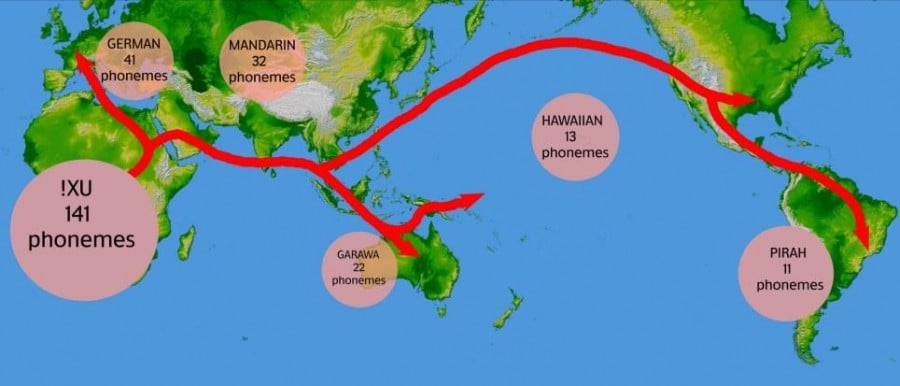A new study encourages discussion of the origin of language and how it spread. Did it originate from one location and spring outward, or did it manifest in various locations, all over the globe, and evolve individually?
According to an April issue of The New York Times, Dr. Quentin Atkinson, who received his Ph.D. in psychology from the University of Auckland, published a study supporting that language originated from one location: southern Africa.
According to The New York Times, Atkinson’s study combined mathematical methods and linguistics to create a computer program that looked at the phonemes of 504 different languages. According to New Scientist, phonemes are sounds that, for example, create the “c”, “a”, and “tch” in the word “catch”.
Dr. Ralf Thiede, associate professor of applied linguistics at University of North Carolina at Charlotte, sees the merit in combining different types of research.
“Any time an area of research can replicate conclusions from another area of research, there is the excitement of confirmation of knowledge,” said Thiede in an email interview. “I am not quite convinced that the genetic findings that tell the story of human migration are confirmed by Atkinson’s linguistic study, but surely we can appreciate the potential of modern interdisciplinary research.”
African languages contain a higher number of phonemes, and the clicking sounds present in some African languages demonstrate this idea, according to The New York Times. The number decreases the farther away from Africa one lives, according to Science Daily.
This phenomenon parallels the “serial effect,” which, according to New Scientist, is the “thought that humans first lived in a large and genetically diverse population in Africa, from which smaller groups broke off and migrated to what is now Europe.”
Atkinson’s research applies this same effect to language, according to New Scientist. As earlier humans migrated from Africa, the genetic and phonemic diversity became less varied. For example, Hawaiian languages, one of the farthest locations from Africa, use only 13 phonemes, according to The New York Times.
“I am impressed with the mathematical methodology, which presents an intuitively coherent picture, but that very coherence also gives me pause,” said Thiede in an email interview. “North America, for example, shows up as an area of a weak inverse relationship between phonemic diversity and distance from the origin. The linguistic landscape of North America is complex, not as uniform as the smooth shading of Atkinson’s maps.”
Other linguists are concerned with another issue that Atkinson’s research presents. According to The New York Times, “linguists tend to dismiss any claims to have found traces of language older than 10,000 years.” Some linguists may approach Atkinson’s research with caution because he is tracing language back 50,000 years, when modern humans dispersed from Africa, according to The New York Times.
While one group remains wary of the study, others marvel in Atkinson’s findings. One such person is Mark Pagel, a biologist at the University of Reading in England.
“What’s so remarkable about this work is that it shows language doesn’t change all that fast,” said Pagel to The New York Times. “It retains a signal of its ancestry over tens of thousands of years.”
Dr. Tracey Snipes, professor of speech pathology at North Carolina Agricultural and Technical State University, shared this study with her phonetics class the first week of school. She felt Atkinson’s article helped create a dynamic discussion in class.
“We live in a culture where people are still discriminated against because of the way they speak,” said Snipes. “Oftentimes, especially black people who speak a dialect are frowned upon. I thought it would be interesting to get the class’s feedback on what they think if speech actually originated in Africa.”
The ink still drying on this research, leaving many such as Donald Hinge, a linguist at the University of Pennsylvania, believing it is too soon to know if Atkinson’s research is correct.
“But if (it is true), it’s one of the most interesting articles in historical linguistics I’ve seen in a decade,” said Hinge to The New York Times.

